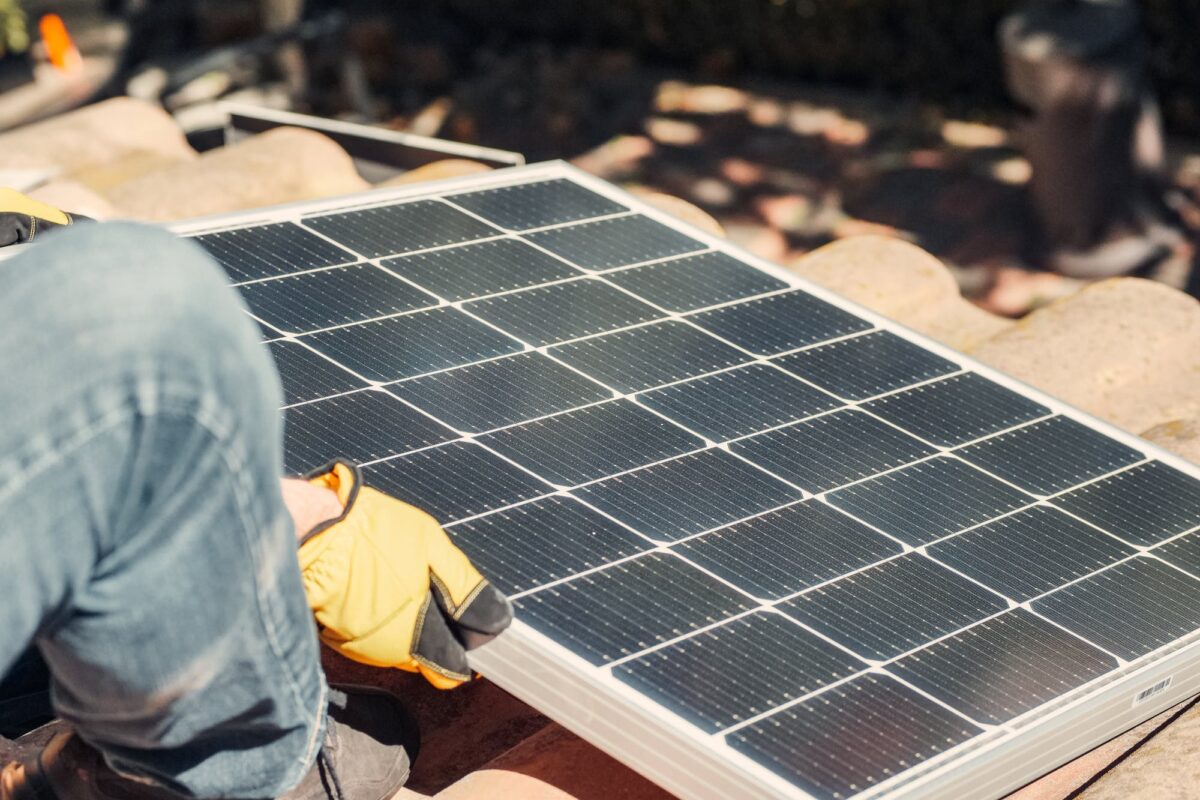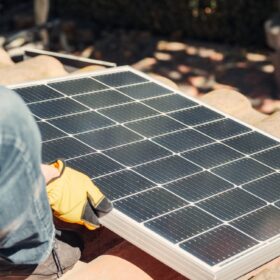Another week, another bunch of announcements! To stay up to date on what’s new, check out this latest cleantech product roundup:
New DG modules
China-based PV manufacturer JinkoSolar launched a new series of solar modules for distributed generation projects. The Tiger Pro 54HC panel is available in five versions with power ratings ranging from 395 W to 415 W, and efficiency ranging from 20.28% to 21.3%.

The new product is made with 108 high-efficiency, half-cut monocrystalline cells and features a maximum system voltage of 1,500 V. More info available here.
All-electric utility truck
New York City-based utility Con Edison and partners Lion Electric and Posi-Plus are developing an all-electric bucket truck capable of performing the range of work that electric utilities require of such vehicles.
Lion Electric, a North American manufacturer of zero-emission heavy-duty vehicles, and Posi-Plus are building the truck to Con Edison’s specifications, with a Lion8 chassis and aerial equipment drive. Delivery of the vehicle in early 2022 will be followed by its use in a pilot program. If the pilot is successful, the Class 8 bucket truck will be integrated as part of Con Edison’s fleet of trucks that maintains the overhead electric system in New York City and Westchester County, New York.

As of last year, every new light-duty vehicle that Con Edison buys is a plug-in hybrid or all-electric. The utility said it is exploring a range of technologies to reduce its fossil fuel use in medium- and heavy-duty vehicles, and it may add more all-electric bucket trucks to its fleet in the future. More info available here.
SolarWindow efficiency boost
SolarWindow Technologies, developer of transparent liquid coatings and processes for generating electricity on glass and plastics, said it has more than doubled its prior certified performance and achieved the highest independently certified power conversion efficiency of previous organic photovoltaic devices fabricated at the U.S. Department of Energy’s National Renewable Energy Laboratory through a Cooperative Research and Development Agreement.
SolarWindow reported a power conversion efficiency of 14.72% (+/- 0.29%) using industry-standard single-cell patterning for performance testing. Spurred by these results, the company said engineers are working to further optimize power conversion efficiency for a single cell and translate this efficiency to large-scale applications for products such as electricity-generating glass windows for buildings, automotive sunroofs, and more. More info available here.
MIT cell research
Scientists at the Massachusetts Institute of Technology (MIT) have proposed a new approach to identify the best perovskites for solar cell applications, depending on specific goals such as longevity, efficiency, and producibility, as well as the availability of source materials that the manufacturers aim to achieve.

The researchers described the approach as a physics-constrained sequential learning framework to identify the most stable alloyed organic-inorganic perovskites. More info available here.
Trailblazing Jeep chargers
Automaker Jeep and Electrify America said they plan to set up trailhead charging sites for electric vehicle batteries at three sites: Moab, Utah; the Rubicon Trail in Pollock Pines, California; and Big Bear, California.

Image: Jeep
The grid-connected or solar-powered chargers will use Level 2 (240-volt) charging. The automaker said that the 17 kWh battery pack in its Jeep Wrangler 4xe can be recharged in about two hours, providing around 21 miles of electric range. Other charging stations are slated to be in place by year’s end. More info available here.
Battery and panel recycling
ERI and Redwood Material have entered into an exclusive partnership for battery recycling. As part of the deal, Redwood Materials has made a significant strategic investment in ERI. JB Straubel, co-founder and CEO of Redwood Materials and a former chief technology officer and co-founder of Tesla, has been elected to ERI’s board of directors. Additionally, the partnership means Redwood and ERI will launch a new business line for the responsible recycling of solar panels. More info available here.
Berkley lab advancements
In the past 50 years, scientists have made great advances in photovoltaic technologies that convert sunlight into electricity, as well as artificial photosynthesis devices that convert sunlight and water into carbon-free fuels. But Lawrence Berkeley National Laboratory said the current state-of-the-art technologies still lack the efficiency to compete with electricity or transportation fuel derived from petroleum.

Scientists at Berkely Lab, DESY, the European XFEL, and the Technical University Freiberg, Germany, reported they have discovered a hidden charge-generating pathway that could help researchers develop more efficient ways to convert sunlight into electricity or solar fuels like hydrogen. More info available here.
Software offering
PV product manufacturer Q CELLS announced a new deal allowing the company’s partner program members to receive exclusive access to Aurora Solar’s solar design and sales software.
Under the deal with Aurora Solar, Q.PARTNER installers are eligible to register their products to earn points and redeem them for a premium monthly or annual subscription to Aurora through the Q.PARTNER Portal. With Aurora’s subscription service, solar installers have the opportunity to deliver a visual and interactive customer experience that could help close more sales. More info available here.
Ground-mount racking
Pittsburgh-based manufacturer BCI Engineering announced Full Tilt, a ground-mount solar racking system. The company said Full Tilt represents an optimum fixed-tilt racking solution with fewer parts, manufacturer-direct pricing, and versatile module loading and fastening methods.

BCI said the system also introduces a new type of panel rail, called the Longhorn, which allows modules to slide into notches on the rail, enabling the ability to self-align modules and improve installation speed. More info available here.
This content is protected by copyright and may not be reused. If you want to cooperate with us and would like to reuse some of our content, please contact: editors@pv-magazine.com.









By submitting this form you agree to pv magazine using your data for the purposes of publishing your comment.
Your personal data will only be disclosed or otherwise transmitted to third parties for the purposes of spam filtering or if this is necessary for technical maintenance of the website. Any other transfer to third parties will not take place unless this is justified on the basis of applicable data protection regulations or if pv magazine is legally obliged to do so.
You may revoke this consent at any time with effect for the future, in which case your personal data will be deleted immediately. Otherwise, your data will be deleted if pv magazine has processed your request or the purpose of data storage is fulfilled.
Further information on data privacy can be found in our Data Protection Policy.